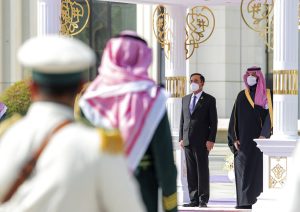On January 25 of this year, the now-suspended Thai Prime Minister Prayut Chan-o-cha landed in Saudi Arabia and received a lavender-carpet welcome – something reserved for important official state receptions – from the kingdom’s de facto ruler, Crown Prince Mohammed bin Salman (better known as “MBS”), at the Al-Yamamah Palace. There, both sides made an official announcement that they would fully resume frozen diplomatic relations, putting an end to over three decades of hostility stemming from the 1989 Saudi gem heist by a Thai cleaner and the series of unsolved crimes that followed it.
The rapprochement with Saudi Arabia was a big foreign policy triumph for the domestically unpopular Prayut government. Previous Thai administrations had repeatedly sought to mend the broken ties with Riyadh, with little success.
No doubt, luck was on the Prayut administration’s side. MBS, who rose to power in 2015 and secured his path to kingship in 2017 through the removal of his elder cousin Mohammed bin Nayef from the line of succession, is nothing like his conservative predecessors. MBS has introduced many groundbreaking changes to the country’s traditional practices, for instance, by replacing royals in top government positions with business experts and moving away from the oil-based economy – a plan which will inevitably require a transformation of the existing political order and foreign relations. MBS has already done the unthinkable by warming up to Iran and Israel, Saudi Arabia’s arch-enemies. His embrace of Thailand should therefore not come as a surprise.
But, like it or not, some credit must be given to the Prayut government for seizing the window of opportunity to reconcile with the Saudis. According to veteran Thai journalist Kavi Chongkittavorn, Thailand’s Foreign Minister Don Pramudwinai was the man who discreetly initiated the rapprochement talks in 2016. From that point onward until very recently, MBS had been shunned by the international community for ousting his own relatives and allegedly being involved in the killing of the journalist Jamal Khashoggi. The normalization process could have been delayed or even lost if a different and seemingly more righteous Thai faction, such as the Move Forward Party, was in charge.
Shortly after the January rapprochement, substantive cooperation in traditional areas (tourism, labor, energy, and food security) began materializing. The first commercial flight carrying 56 passengers from Riyadh to Bangkok arrived on February 28. A month later, a memorandum of understanding on the export of Thai labor to Saudi Arabia was signed. Then, in May, Foreign Minister Don led a high-profile trade mission to Saudi Arabia, reaffirming Thailand’s readiness to supply Saudi Arabia with Halal products and to explore cooperation in new areas such as digitization and aerospace. Simultaneously, state-controlled energy giant Saudi Aramco agreed to increase oil exports to its Thai counterpart PTT. The two partners vowed to deepen collaboration on renewable energy.
Fast forward to early August, and the total number of arrivals from Saudi Arabia jumped to 35,000. Thailand hopes to attract up to 300,000 Saudi visitors by the end of the year, and this goal is likely to be reached thanks to the enforcement of a 30-day visa on arrival for Saudi Arabian passport holders.
And, just last week, another MoU to create the Thai-Saudi Business Council was signed. This was a significant step toward cementing Thai-Saudi trade ties, paving the way for a mutually beneficial free trade agreement. With the help of Saudi Arabia, Thailand could very well seal new trade deals with countries in the Gulf Cooperation Council.
While it is clear that Thai-Saudi relations have primarily been driven by economic motivations, there appears to be room for political cooperation. After all, Thailand and Saudi Arabia are facing similar challenges and are adopting similar postures in international relations. Both are long-standing American strategic allies (though Saudi Arabia has never signed a treaty pact) in their respective regions. Their alliances with Washington, however, have often been complicated by human rights issues arising from their domestic situations.
Adding to Washington’s annoyance is the fact that both nations, in an effort to pursue national interests and avoid the costs of strategic alignment amid a volatile global landscape, have maintained close ties to China and Russia. Thailand engaged in an air exercise with China very soon after the outbreak of the new Taiwan crisis. Saudi Arabia, meanwhile, pretty much sided with Russia in the wake of its invasion of Ukraine.
Indeed, in a joint statement released back in January, Thailand and Saudi Arabia pledged to “support each other in international organizations” and respect principles of “sovereignty” and “non-interference.”
Thailand, in particular, has tried to forge closer ties to global middle powers as a hedging strategy. Srawut Aree, a Muslim studies specialist at Chulalongkorn University, said that Thailand has already established good relations with two key players in the Middle East namely Iran and Turkey. An improved relationship with Saudi Arabia, the third key player, will give Thailand more room for maneuver in this region.
Furthermore, as noted by Chongkittavorn, normalized Thai-Saudi relations will lead to a better relationship with the Organisation of Islamic Cooperation, of which Saudi Arabia is a leading member. This should, ideally, help facilitate constructive dialogues between the Thai state and Muslim communities in Thailand’s troubled Deep South.
Potentials for fruitful Thai-Saudi cooperation beyond economic matters exist, but whether these will be unlocked remains to be seen. Restoring broken trust and bridging large cultural gaps will not be easy.

































